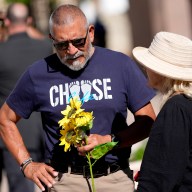 Bob Odenkirk plays a news anchor with a cranky, alkie father in “Nebraska.”
Bob Odenkirk plays a news anchor with a cranky, alkie father in “Nebraska.”
Credit: Getty Images
Along with David Cross, Bob Odenkirk is responsible for the sketch comedy landmark “Mr. Show.” But he’s done plenty of drama — just the funny kind. His role as sleazy (but weirdly capable) lawyer Saul Goodman was one of the highlights of “Breaking Bad.” “Nebraska” reunites him with “SNL” favorite Will Forte, who he directed in “The Brothers Solomon.” But it’s a serious comedy — a funny-moving study from “Sideways”’s Alexander Payne of a family whose sons (Forte and Odenkirk) have to deal with an aging, stubborn, alcoholic father (Bruce Dern) who thinks he’s won one million dollars. (He hasn’t’.)
How did you get involved in a dramedy from a major filmmaker that reunites you with Will Forte?
I have auditioned for three of Alexander’s films. I read for “Sideways,” and I read for “About Schmidt,” and I read for this. I love his work, I’m a huge fan. I felt very confident in playing Ross because I feel like I know him for a number of reasons — not the least because my father had an alcohol problem. My response to the whole experience was not unlike Ross’s, which is anger and lack of forgiveness.
People make a big deal out of comics doing drama and vice versa. How do you feel about that?
I just look at the character and see if I can play him honestly — see if I can relate, see if I can understand where their energy comes from and what they’re after. And that’s all I concern myself with.
Is drama the same thing as comedy, generally speaking?
I probably have a harder time playing large on some of those sketch comedy stages that I perform on than I do playing smaller and internalizing. And by the way, Vince Gilligan gave me the role of Saul Goodman because of “Mr. Show,” not for anything else. I think there’s probably a couple things on “Mr. Show” where you can see the kind of commitment and modulation that a dramatic performance needs to have.
Did you ask him which sketches inspired him casting you?
I didn’t ask him. I never want to look too close in the gift horse’s mouth. I’m just like “Whatever you say, Vince, thank you.” Then I walk away. I don’t want to ask why these lunatics give me these opportunities, but if they want to keep giving me wonderful chances, I’ll take them.
Being a film director yourself, what is it like working with someone like Payne?
I keep saying how confident Alexander is. And that’s something that’s refreshing and that only makes you feel more secure and able to risk and try things. A lot of filmmakers and a lot of us making art, we’re crossing our fingers behind our back, going “Hope this works!” I think Alexander Payne is not crossing his fingers. He does the work in every side of his filmmaking. I heard he spent a year finding locations. He’s done the hard work.
You’re from the Midwest. How accurate is this movie?
That dinner scene in the movie — I had so many of those dinners. They’re not farmers, my family, but my god, that was just like every thanksgiving I went to until I was 27, 28.
Where all the men don’t talk and watch football…
Everyone’s watching football, the women talking, lunatic comments, funny characters, resentments that kind of creep out, friendliness, warmth, forgiveness — it’s all on display. Sometimes you look at those people and you go, “What a clown car I’m in.” And then sometimes you look at them and think, “These are the best people ever, and I love them all.” You can see if from many sides. And I think this movie is the same way: You can see it as a funny comedy in a lot of ways, but also as a devastating, honest portrait of a family.













